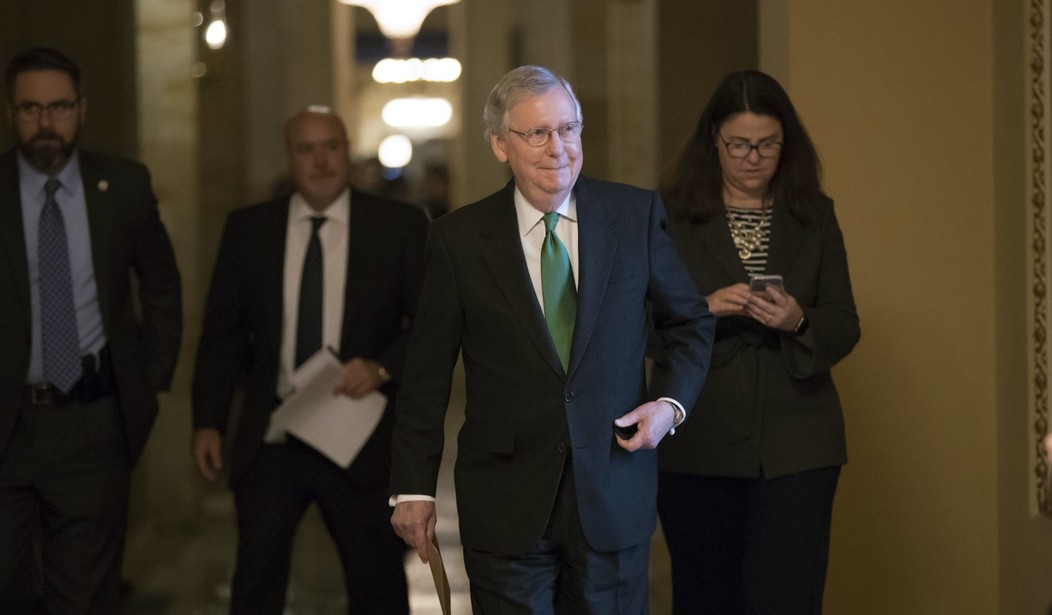WASHINGTON — The day before what would have been another shutdown, Republicans and Democrats struck a 2-year, nearly $400 billion budget deal that upon passage will segue into Senate Majority Leader Mitch McConnell’s (R-Ky.) promised DACA debate.
The deal removes sequestration budget caps for two years, increases defense spending and also boosts funding for domestic programs that were priorities for Democrats, such as opioid addiction programs. It also raises the debt ceiling until 2019.
It was unclear if the Senate deal will get enough support when it goes to the House.
“The compromise we’ve reached will ensure that, for the first time in years, our armed forces will have more of the resources they need to keep America safe. It will help us serve the veterans who have bravely served us. And it will ensure funding for important efforts such as disaster relief, infrastructure, and building on our work to fight opioid abuse and drug addiction,” McConnell said on the Senate floor this afternoon.
“This bill is the product of extensive negotiations among Congressional leaders and the White House. No one would suggest it is perfect,” he acknowledged. “But we worked hard to find common ground and stay focused on serving the American people… and the agreement will clear the way for new investment in our nation’s infrastructure — a bipartisan priority shared by the president and lawmakers in both parties.”
McConnell noted that after passage, the Appropriations committees “will have six weeks to negotiate detailed appropriations and deliver full funding for the remainder of fiscal year 2018.”
Minority Leader Chuck Schumer (D-N.Y.) said he and McConnell “worked well together for the good of the American people.”
“We had serious disagreements, but instead of just going to our own separate corners, we met in the middle and came together with an agreement that is very good for the American people and recognizes needs that both sides of the aisle proffered,” Schumer said on the floor. “…After months of fiscal brinkmanship, this budget deal is the first real sprout of bipartisanship. And it should break the long cycle of spending crises that have snarled this Congress and hampered our middle class.”
Along with various healthcare initiatives, programs benefiting from a $63 billion hike in non-defense domestic spending include $6 billion to fight the opioid and mental health crises, $5.8 billion for the Child Care Development Block Grant program, $4 billion to improve veterans hospitals and clinics, $2 billion for the National Institutes of Health, $20 billion to augment existing infrastructure programs — including the rural broadband development sought by Dems — and $4 billion for college aid.
The Children’s Health Insurance Program got a four-year extension, and community health centers will see funding increases.
On Democrats’ demand to shore up pensions, Schumer said they agreed to “a special select committee that must report a legislative fix to the problem by December 2018.”
“Millions of pensioners – miners, teamsters, carpenters, bakery workers, and so many more – are staring down cuts to their hard-earned pensions,” he said. “They didn’t do anything to cause those cuts. Their livelihoods are staked to these pensions.”
Schumer added that the budget, which “was completed without a great deal of help from the White House,” will “do so much good for our military, for so many middle-class Americans, and finally consign the arbitrary and pointless sequester caps to the ash heap of history.”
On moving to the Deferred Action for Childhood Arrivals fix, which McConnell promised to bring an end to the last shutdown, the GOP leader said the chamber’s “upcoming debate on DACA, border security, and other issues will be a process that is fair to all sides.”
“The bill I move to, which will not have underlying immigration text, will have an amendment process that will ensure a level playing field at the outset,” he said. “The amendment process will be fair to all sides, allowing the sides to alternate proposals for consideration and for votes. While I obviously cannot guarantee any outcomes, let alone supermajority support, I can ensure the process is fair to all sides. And that is what I intend to do.”









Join the conversation as a VIP Member